#Marc literally shows Steven how he suffered the most horrible and painful injuries to his soul
Photo
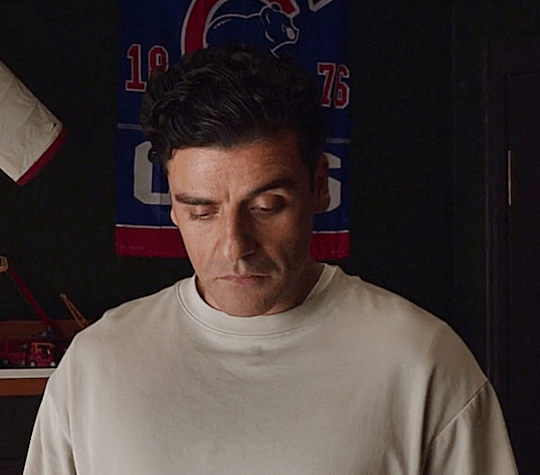
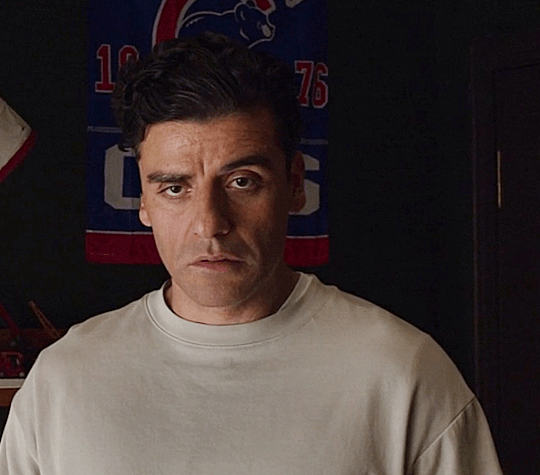
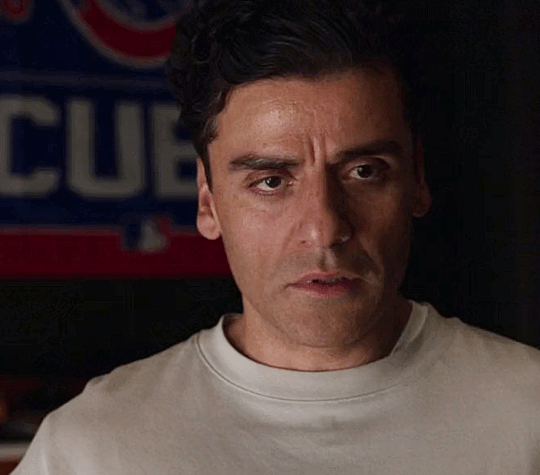
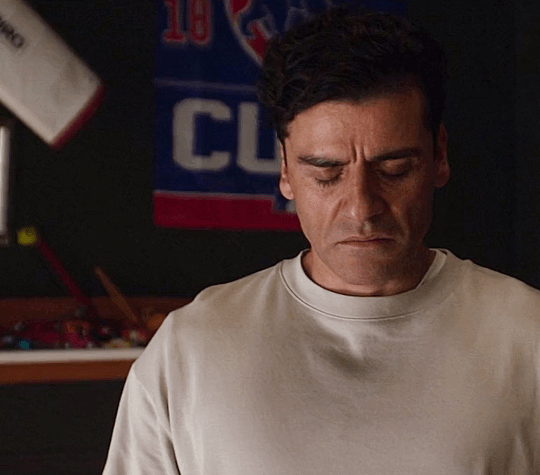


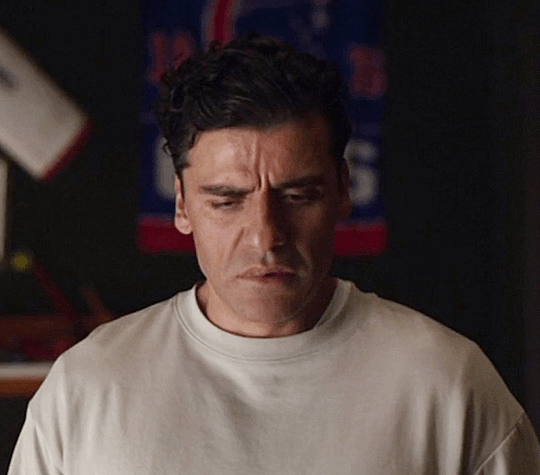
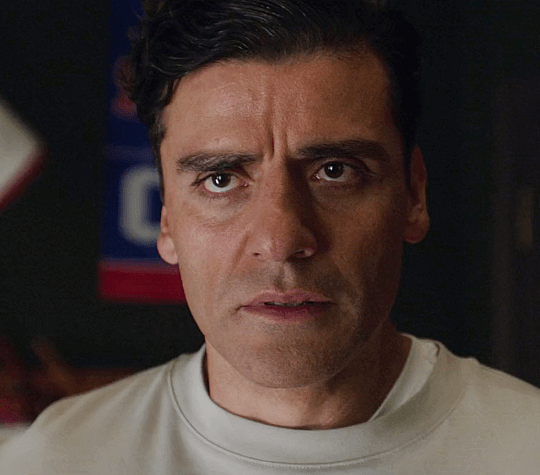
I’m just begging you: Don’t make us go there again.
#oscar isaac#moon knight#marc spector#moonknightedit#chrissie gifs#tw: trauma#tw: child abuse#It still blows my mind how the people involved in this show seemed to have a better understanding of trauma#than most professional therapists do#It's so heartbreaking to see how you can literally see Marc being stuck in his freeze reaction#While Steven moves around and explores#Marc's feet are rooted to the spot#He doesn't get a word out and he is clearly struggling to breathe#He can't even move his body towards the threat (i.e. his mother banging against the door) so he mostly just moves his eyes#Until the door bursts open and Marc's flight mode is activated#There is so much evidence that talking about your trauma again and again does nothing to integrate it and heal from it#And Harrow is such a text book example of so called health care professionals that force their patients to be re-traumatized again and again#Marc literally shows Steven how he suffered the most horrible and painful injuries to his soul#And it neither helps him to integrate his trauma nor to balance the scales#The healing process only starts when he allows himself to start learning to be accepted and taken care of by Steven#I am sorry I just love him so much 🥺
195 notes
·
View notes
Text
What happened to recent NFL teams after they went 0-16, 1-15?
The Browns are guaranteed to finish with zero wins or one. What does history tells us is next for them?
In the NFL, there’s run-of-the-mill bad, and then there’s historically bad — and the former is much more common than the latter. Since 2000, 35 teams have finished with two- or three-win seasons. Only six have finished with one win or fewer.
Not only have the 2017 Cleveland Browns qualified as the seventh team on that list, they’re the only franchise to show up on it twice. And they’ve done it two years in a row. Even if they manage to upset the Steelers Sunday — the Browns haven’t won in Pittsburgh since 2003 — they’ll merely match last year’s 1-15 campaign.
While most teams have been able to rebound from their ignominious campaigns, the Browns have remained mired in a sadness landfill of their own design. 2018 provides a modicum of hope, but it will take a substantial effort from new general manager John Dorsey. Fortunately, there’s a few blueprints he can follow.
These bottomings-out often led to a revival behind a rookie quarterback or impact player selected with the No. 1 overall pick the following spring, but it takes more than just one player to fix a horrible team. Here’s how every zero- or one-win team has performed in its ensuing season — and how they got there.
2016 Cleveland Browns: 1-15
The only team on this list to actually get worse the following year. At least they got Myles Garrett (six sacks in eight starts through Week 16) out of the deal.
The next season: Guaranteed to finish either with the same record or become just the second team to ever finish 0-16.
2009 St. Louis Rams: 1-15
A 2-14 season in 2008 gave way to a 1-15 disaster the following year, as West Texas A&M legend Keith Null made the only four starts of his career as part of a quarterback rotation that included Marc Bulger and Kyle Boller. Somehow, the Rams’ total offense wasn’t the worst in the league, thanks to the presence of Steven Jackson, whose 1,416 rushing yards were the lone bright spot in a lost year.
The next season: The Rams rebounded by using the No. 1 pick to draft Sam Bradford, who rode Jackson and an underwhelming receiving corps to a 7-9 record the following year. That seven-win record would prove unsustainable until Jeff Fisher took over as head coach in 2012, when it became commonplace. It would be eight years before the team returned to the playoffs — thanks in part to another quarterback drafted at No. 1, Jared Goff.
2008 Detroit Lions: 0-16
Bad quarterback play reared its ugly head once again in the first 0-16 season in league history. Detroit burned through an injured Jon Kitna, a past-his-prime Daunte Culpepper, Drews Stanton and Henson, and Dan Orlovsky, whose career as a moderately useful backup will be forever marred by his justified fear of Jared Allen:
Those five passers who combined for a 71.3 rating, a mark somehow worse than 2016 Brock Osweiler. A last-place defense wasn’t any better, boasting zero Pro Bowlers but also a rookie Cliff Avril up front.
“It wasn’t a fun year. I don’t wish it upon anybody,” Orlovsky recently told the New York Post’s Steve Serby.
The next season: Culpepper returned to back up 2009 No. 1 overall pick Matthew Stafford, whose growing pains were both figurative and literal. The Lions made modest improvements to go 2-14 the following year. They hit the six-win plateau in 2010, then faded in and out of playoff contention — without winning an actual playoff game — behind Stafford from the turn of the decade on.
2007 Miami Dolphins: 1-15
Once again, terrible quarterback play is a major factor, as the Dolphins cycled through Cleo Lemon, Trent Green, and John Beck en route to a one-win season. The biggest blow, however, was losing 1,000-yard rusher Ronnie Brown after seven games to a knee injury suffered attempting to make a tackle after a Lemon interception. Spending their first two picks on Ted Ginn and Beck, especially with talent like Patrick Willis, Darrelle Revis, Joe Staley, and Ryan Kalil on the board, proved to be an ineffective strategy.
The next season: Their sink to the bottom of the NFL produced future All-Pro offensive tackle Jake Long, but it was the addition of a resurgent Chad Pennington and the return of Brown, who helped bring the wildcat formation to the pros, that sparked an 11-5 season. The 2008 Dolphins are the only non-Patriots team to win the AFC East in the last 15 years. They had to get creative to do so, but Miami managed to pull off one of the most impressive turnarounds in league history.
2001 Carolina Panthers: 1-15
Chris Weinke, a 29-year-old rookie, threw 11 touchdown passes and 19 interceptions for a team that won its season opener over the Vikings, then dropped 15 straight to cap a miserable campaign. Carolina was better than its record and roster suggests, however. The Panthers lost a pair of games in overtime and had five more games decided by four points or fewer.
The next season: A coaching change shuffled George Seifert out of the locker room and brought in John Fox, who somehow gleaned a 7-7 record out of a 36-year-old Rodney Peete. The key was a defense that allowed just 290 yards per game (second in the NFL) behind the efforts of Julius Peppers, Dan Morgan, Kris Jenkins, and a ferocious pass rush. One year later, Fox supplemented that elite defense with a competent Jake Delhomme at quarterback, leading the franchise to its first Super Bowl just two years after going 1-15.
2000 San Diego Chargers: 1-15
San Diego’s primary quarterbacks were all-time draft bust Ryan Leaf and college football weirdo Jim Harbaugh as the team threw a total of 19 touchdown passes and 30 interceptions. The team’s leading rusher, by carries, was Jermaine Fazande. The Chargers were the worst possible team to play as in NFL Blitz.
The next season: One year later, they’d plant the seeds of an awesome Blitz team by drafting a pair of future Hall of Famers in LaDainian Tomlinson and Drew Brees. While Brees only played in one game as a rookie (playing behind Doug Flutie), Tomlinson broke out for more than 1,600 yards from scrimmage and 10 touchdowns to lead the team to a more respectable 5-11 record. That led to the firing of head coach Mike Riley and the hiring of Marty Schottenheimer, who would help push the team to a 14-2 record in 2006 before being fired after failing to escape the Divisional round of the playoffs.
So can the Browns recover?
There’s some good news here for Cleveland. The Chargers’ race to bedrock allowed them to trade down from the No. 1 pick and get LT and then Brees at the top of the second round. That’s the best-case scenario, even if it failed to lead to a Super Bowl.
The Panthers had what would have been the No. 1 pick stolen from them by the expansion Texans, but that worked out in their favor by dropping Julius Peppers into their lap. The Lions wound up with Matthew Stafford, whose fourth-quarter wizardry has been both instrumental and wasted in Detroit. The Dolphins got a steady pocket protector and a gimmick offense that led to unsustainable success. The Rams got Bradford and, eventually, a coach better known for his 7-9 bullsh*t than leading the Titans to a Super Bowl.
It’s a mixed bag.
The Browns have some nice pieces in place, and four top-40 picks in 2018’s draft will supplement the team’s rebuild. Step one will be finding a quarterback, which won’t be a problem in a passer-rich year. Step two will be convincing him to come to Cleveland, which might be.
Getting that out of the way will allow the team to address its other flaws and begin a turnaround. History shows you can go from 0-1 losses to a division title in one year or to the Super Bowl in two. History also shows the Browns are a terrible sinkhole that sucks hope down to the earth’s core and crushes it into a tiny, insignificant pellet.
So it can go two ways for Cleveland.
0 notes